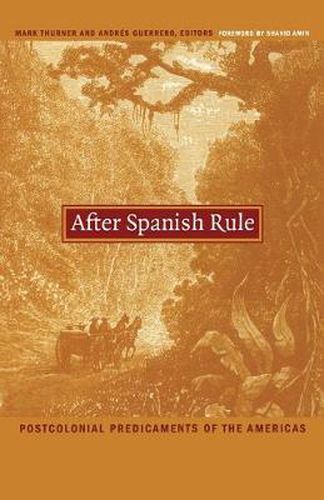Readings Newsletter
Become a Readings Member to make your shopping experience even easier.
Sign in or sign up for free!
You’re not far away from qualifying for FREE standard shipping within Australia
You’ve qualified for FREE standard shipping within Australia
The cart is loading…






Insisting on the critical value of Latin American histories for recasting theories of postcolonialism, After Spanish Rule is a collection of essays by Latin Americanist historians and anthropologists which engage postcolonial debates from the perspective of the Americas. These essays extend and revise the insights of postcolonial studies in diverse Latin American contexts, ranging from the narratives of 18th-century travelers and clerics in the region to the status of indigenous intellectuals in present-day Colombia. The editors argue that the construction of an array of singular histories at the intersection of particular colonialisms and nationalisms must become the critical project of postcolonial history-writing. Challenging the universalizing tendencies of postcolonial theory as it has developed in the Anglophone academy, the contributors are attentive to the crucial ways in which the histories of Latin American countries - with their creole elites, hybrid middle classes, subordinated ethnic groups, and complicated historical relationships with Spain and the United States - differ from those of other former colonies in the southern hemisphere. Yet, while acknowledging such differences, the volume suggests a host of provocative, critical connections to colonial and postcolonial histories around the world.
$9.00 standard shipping within Australia
FREE standard shipping within Australia for orders over $100.00
Express & International shipping calculated at checkout
Insisting on the critical value of Latin American histories for recasting theories of postcolonialism, After Spanish Rule is a collection of essays by Latin Americanist historians and anthropologists which engage postcolonial debates from the perspective of the Americas. These essays extend and revise the insights of postcolonial studies in diverse Latin American contexts, ranging from the narratives of 18th-century travelers and clerics in the region to the status of indigenous intellectuals in present-day Colombia. The editors argue that the construction of an array of singular histories at the intersection of particular colonialisms and nationalisms must become the critical project of postcolonial history-writing. Challenging the universalizing tendencies of postcolonial theory as it has developed in the Anglophone academy, the contributors are attentive to the crucial ways in which the histories of Latin American countries - with their creole elites, hybrid middle classes, subordinated ethnic groups, and complicated historical relationships with Spain and the United States - differ from those of other former colonies in the southern hemisphere. Yet, while acknowledging such differences, the volume suggests a host of provocative, critical connections to colonial and postcolonial histories around the world.